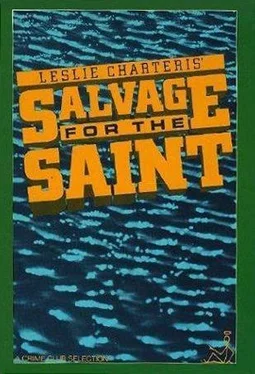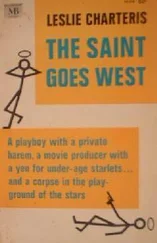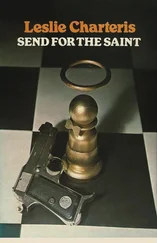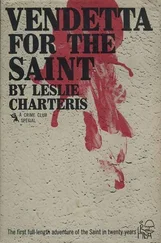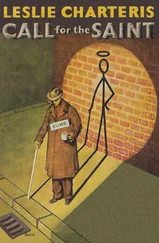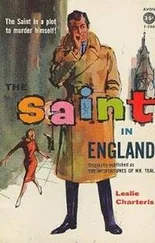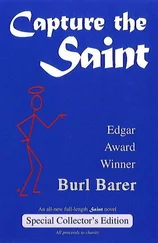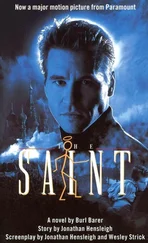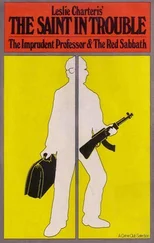Arabella shifted impatiently on her chair.
“Well — what happened next?”
“The champagne, alas, was our undoing. We finished first the loading — we transfer the gold. Now our launch — she is low in the water, but still a very fast boat. We drink a final toast. Then suddenly, comes the French coastguard — an armed boat! And we are caught.”
He paused and leaned forward, his smile completely gone now, and his face reddening.
“Do you listen, Madame? We are caught — except for Karl, and the gold. Brrrmmm! He goes. Very fast. The gunboat shoots, he drives dodging. They chase — many miles. So it is told at the trial, our trial. But Karl — he escapes. And afterwards, there is prison for us.”
“We get eight lousy years apiece in jail.” Bernadotti spat the words out sourly. “And your goddamn Charles gets clean away. Pfft! Vanishes into thin air.”
“Until last month,” Descartes continued, “when we see a magazine regarding the boating, and the race which is to take place from the island. And there on the page — a photograph. He is older, yes. White hair, yes. A different name. But the same man. Our Karl Schwarzkopf!” He turned again to Arabella. “Madame, would you not, in our place, desire that gold?”
“Yes,” said Arabella. “And in my place, too... Anyone for more bacon?”
During the answering rush of unenthusiasm Simon thought over the account they had just heard. It had certainly put some colourful flesh on what until then had been the bare bones of a story; but it had added nothing much of new substance, except perhaps the fact that Schwarzkopf, as he then was, had given the coastguard the slip after “many miles” in a good boat that must have been heavily weighed down with gold. Whether it could have reached the Coriscan coast from the vicinity of Marseille in one hop, or at all, was certainly open to question.
The Phoenix, however, had indubitably made that trip on a number of occasions, if Finnegan was to be believed; and she was now, as the night wore on, a good halfway there once again. A little while before, Simon had given the helm back, somewhat dubiously, to a Finnegan who was at least two sheets to the wind.
“Don’t you worry. I could navigate her in me sleep, so I could,” he had maintained.
Simon hoped it wouldn’t come to that, but as a precaution he had insisted that Bernadotti receive some elementary instruction and be prepared to stand by as a reserve helmsman. This arranged, Simon and Arabella had at last settled their suitcases in the Phoenix’s two comfortable guest staterooms. Descartes and his henchmen having cautiously elected to remain for the night in the saloon, that left Finnegan in continued occupation of his regular port-side cabin, which adjoined the galley.
Arabella, pleading tiredness, had gone to her cabin soon after the bacon-and-egg meal; and the Saint now decided to amble back up to the wheelhouse to reassess the current juggedness of Finnegan.
The two sheets to the wind had become two and a half, as the Saint had guessed from the movement of the boat. The bibulous Captain was groggy and bleary-eyed, but still standing.
“In Dublin’s fair ci-ty,” he sang, and wound the wheel right “...where the girls are so pret-ty... I forrst set me eye-ees...” He wound the wheel left, as he sang unsteadily on: “... on sweet Mol-ly Ma-lone...”
Simon shook his head sadly in a kind of tolerant wonderment, and went aft to look out over the stern.
On the calm sea the Phoenix’s wake was clearly visible in the moonlight for perhaps half a mile back. It described a pronounced zig-zag; a small redeeming feature being that the directional trend of the wake, if the zig-zags were averaged out, was fairly consistent, which meant that Finnegan was at least managing to maintain the Phoenix’s over-all course.
The Saint was making his way forward again — having decided to leave Finnegan where he was for a while longer but to remove all and any further alcoholic temptation that might be at hand — when he became aware of a pulsating quality in the light reflecting off the sea on the ship’s starboard side. At the same instant a bellow from Bernadotti, who happened to be on deck at the time, indicated that he too had noticed the pulsations of light and had likewise worked out what must be happening.
In her locked cabin, Arabella had removed the shade from a portable reading-lamp and stuck the bulb out of the porthole; and she was busily flashing an approximation of the Morse SOS signal into the night.
Bernadotti, still gripping his automatic, reached the cabin door within fifteen seconds, with the Saint just behind him. Bernadotti hammered on the door.
“C’mon, lady, turn that goddamn light out and open this door!”
It was clear that she had no intention of opening the door and every intention of continuing her signalling. It was as clear to Descartes, who appeared at the Saint’s elbow with Pancho only moments later, as to Simon himself; and he turned at once to the deaf-mute and barked out an order, with exaggerated lip-movements to be sure of being understood at once.
“The fuses — quick! The engine room!” If the Saint’s opinion had been asked he would have had to agree that emergency action was called for. From Simon Templar’s point of view, which was concerned with leaving himself plenty of room to manoeuvre without the complication of further intervention from outside, Arabella’s distress-signal had to be stopped, and quickly. Already, as Pancho shot off down the com-panionway to the engine room, it might be too late. It would depend on the alertness of whoever was at the helm of the boat that had been keeping pace behind them. And it would depend, too, on who that was...
The lights went out suddenly; then, after a few seconds of total darkness, the corridor lights came back on. Pancho must have found the fuse or main switch for the cabin lights, for they could see that there was now only darkness where a strip of flashing light had previously been visible under the door of Arabella’s cabin.
Descartes banged on the door.
“Open now!” he boomed. “Open, I say — or Enrico will shoot the lock. I will count to three only. One... Two...”
Bemadotti raised his automatic and Descartes stood aside.
“Three!”
The gun made a deafening crash that echoed and reverberated back and forth through the ship. The shot made a mess of the door and the jamb, but the lock itself still held — thus giving the lie to the countless western films in which lock-shooting is invariably and instantly successful.
Bernadotti charged the door with his shoulder, and the weakened jamb gave way. He dived into the cabin, grabbed Arabella roughly, and wrenched the lamp away from her. He gripped her painfully by the wrists and tried to drag her out; but she dug in her heels and fought back furiously with a hard kick to his shins followed by a strategically directed knee which caused him to double over in agony. When he finally straightened up it was with an extended string of Italian profanities; and then he advanced on Arabella with one fist upraised.
The Saint had followed him into the small and now unlighted cabin, and his first action was a preventive or, it might be termed, defensive one. The automatic was a nuisance and, so long as it remained in Bernadotti’s grip, a dangerous nuisance. It took the Saint about four seconds to dispose of that hazard in a controlled manner. First the fingers of his left hand closed in a steely grip around the Italian’s right lower wrist, effectively immobilising the joint to prevent the automatic from being turned and fired; and then one bony projecting knuckle of the Saint’s other hand was jabbed up hard into the same wrist, where it found a pressure-point near the pulse. The effect was that Bernadotti’s fingers sprang open as if by magic. The rest of Bernadotti yelped; and the gun, which was the object of the exercise, dropped to the cabin door. The Saint kicked it under the lower bunk, and proceeded from the defensive to the offensive phase of the operation.
Читать дальше
